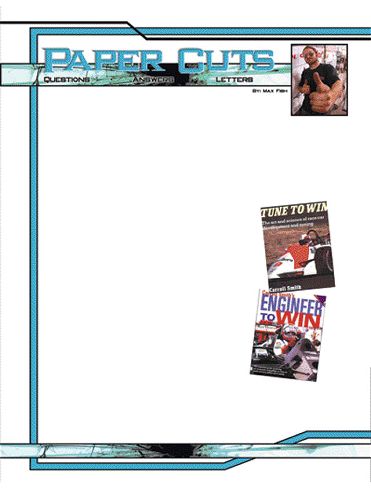
| letters To The Editor November 2007 paper Cuts
Alright guys and girls,
I've only been here for a few months, and I have only received one question so far. Paper Cuts has been given to me to take care of, and I thought for sure I would get more than one person interested in picking my melon for advice or knowledge. You can ask me anything. How about instant-center or why I have a deaf dog patrolling my yard? Maybe you have always wondered why a sleeve-style 'bag is softer than a double-convoluted 'bag, or what to do about the brown stains in your undies. I don't know, something ... anything. If you choose not to ask any questions, I will be given free reign to write about anything I want and that can get messy. So, reach deep into your soul and challenge me, or threaten me, either way, give me some questions to answer. Until then, here is "The One" question. (Like The Matrix, you know?)
Q: Be Cool, Stay in SchoolHey Max,
If I were you, let's say 10 years ago, what would you tell me to study, as far as engineering (classes),chassis-fab frame design, and all the useful learning tools that you are currently using every day in a custom shop? Anything to steer me in the right direction would be appreciated. Thanks.
Envisionyourride
A cell phone somewhere in the 860
A: Well Envisionyourride,That's a great question. Because you are asking me about me 10 years ago, you would need to make sure and cover all three of the necessary disciplines. On a daily basis, I design, engineer, and fabricate.
The design phase is deciding where pivot points should be, how long bars should be, and basically the actual placement of things to accomplish whatever you want the vehicle to excel at. This would be best learned by apprenticing at a shop that builds the type of vehicles you are interested in, but that isn't always feasible. Sometimes, you can get the head designer at one of those shops to answer some of your questions, but that can be tricky, too. There are also some really good books out there that explain a lot, but don't always have all of the information, either. So, a lot of it will be learned from trial and error. Actually, remote-controlled cars are a great way to learn about automotive geometry. That industry pushes the envelope of dynamics, and most of the R.C. car suspension geometry can be directly related to full-size cars.
When you engineer something, you are making sure the material is strong enough to do what the vehicle is intended to do, using the right bolts correctly, so they don't fail in service. Also, there aren't any "stress-risers" designed in your part, simply put, making sure the project lives. This is a little tougher to find information about. I still look at existing vehicles which I know have lived through the abuse I intend to put my project through. There is a lot you can learn, so as to avoid simple problems that will most likely come back to haunt you. Proper bolt use, the right tab thickness, how to draw a tab that resists breaking; this type of knowledge can be found in books, online, and in nature. Shoot, Mother Nature is the best engineer this world has to offer. Look at the tree, for example, it's nearly perfectly engineered.
Fabrication is probably the easiest part to learn. It is the part you see. Pick up a welder and play with it until you are good, notch some tubing to fit your crossmember, and spend some extra time making it fit really nice-even miter some 2x4 tubing to build a frame with the right angle. Almost all fabrication is learned by doing. But don't forget to look at how everyone else is doing it, because I guarantee you, there is someone out there who will make your fabrication skills look infantile. Designing and engineering are nothing without fabrication, but a fabricated part that wasn't engineered or designed to do what it is being forced to do can still exist. Although, probably not for very long.
If you are serious, and think you have the stuff to do it, here is your required reading:
Tune to Win by Carroll Smith
Engineer to Win by Carroll Smith
These two books have the most information in one place that I have found yet, and are an absolute must-have for any beginner or professional who wants to be better at what they do.
Enjoy,
Max
 | letters To The Editor November 2007 paper Cuts
Alright guys and girls,
| letters To The Editor November 2007 paper Cuts
Alright guys and girls,